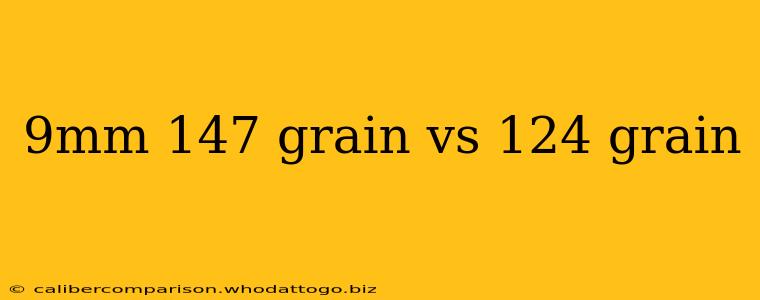Choosing the right ammunition is crucial, whether you're a competitive shooter or prioritizing self-defense. This detailed comparison of 9mm 147-grain and 124-grain ammunition will help you understand the key differences and decide which is best suited for your needs. We'll explore ballistics, recoil, accuracy, and suitability for various applications.
Ballistic Differences: Velocity, Energy, and Penetration
The most significant difference between 9mm 147-grain and 124-grain ammo lies in their ballistic properties. Heavier 147-grain rounds generally exhibit:
- Lower Velocity: They travel slower than their 124-grain counterparts. This translates to a flatter trajectory at shorter ranges, but a more pronounced drop at longer distances.
- Higher Momentum: Despite the lower velocity, the increased mass results in higher momentum. This contributes to greater penetration power, potentially making it more effective for self-defense situations where deep penetration is needed.
- Reduced Recoil: The heavier bullet results in less felt recoil, leading to improved control and faster follow-up shots. This is especially beneficial for less experienced shooters.
Conversely, 124-grain rounds typically have:
- Higher Velocity: They leave the barrel faster, leading to a flatter trajectory at longer ranges. This is advantageous for precision shooting at greater distances.
- Lower Momentum: Their lighter weight results in less momentum compared to 147-grain rounds. This means potentially less penetration, especially through barriers.
- Increased Recoil: The lighter bullet leads to more felt recoil, which can affect accuracy, especially for rapid firing.
Accuracy and Precision: Which is More Accurate?
The accuracy of both 147-grain and 124-grain ammunition depends largely on factors like the firearm, barrel length, and the shooter's skill. However, some shooters find the reduced recoil of 147-grain ammo contributes to improved accuracy, particularly in rapid-fire scenarios. Conversely, the higher velocity of 124-grain ammo might offer a slight edge in long-range precision shooting. Ultimately, testing both types of ammunition with your specific firearm is the best way to determine which offers superior accuracy for you.
Recoil Management: A Key Consideration
As mentioned, 147-grain ammo generally produces less recoil than 124-grain ammo. This softer recoil is a significant advantage for:
- New Shooters: Reduced recoil translates to a more comfortable shooting experience, encouraging proper technique and fostering confidence.
- Smaller-Framed Shooters: Those with smaller hands or less upper body strength may find 147-grain ammo significantly easier to manage.
- Rapid Fire: Less recoil allows for quicker target acquisition and follow-up shots.
Self-Defense vs. Target Shooting: The Best Choice for Each
The ideal choice depends on your intended use:
Self-Defense: The higher penetration potential of 147-grain ammo, combined with its reduced recoil, often makes it a preferred choice for self-defense. The increased penetration can be crucial when dealing with potential threats behind cover or through barriers. However, understanding your local laws regarding ammunition is crucial.
Target Shooting: The higher velocity and flatter trajectory of 124-grain ammo can be advantageous for target shooting, especially at longer ranges. However, the increased recoil might be a drawback for some shooters. Both weights are suitable for target practice, and personal preference often plays a significant role in the final selection.
Conclusion: Making the Right Choice
Choosing between 9mm 147-grain and 124-grain ammunition involves careful consideration of various factors. While 147-grain rounds often excel in self-defense applications due to their higher penetration and reduced recoil, 124-grain rounds can offer advantages in target shooting due to their higher velocity and flatter trajectory. Ultimately, the best ammunition for you will depend on your specific needs, shooting style, and firearm. Experimentation and practical shooting are crucial for determining which round performs best in your hands. Always remember to consult with experienced shooters and firearm professionals for personalized advice.

